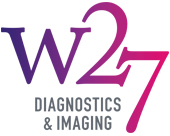An MRI arthrogram uses a specialist type of X-ray and MRI scanning to investigate the causes of joint pain. It can be used to diagnose conditions affecting the shoulder, hip, knee, wrist or elbow.
The two-part procedure, with each taking approx. 25 minutes, involves injecting contrast dye into the affected joint before carrying out an MRI or in some cases a CT scan. It is used to:
- Diagnose what is causing unexplained joint pain or stiffness.
- Identify ligament, cartilage or tendon damage, including tears, degeneration and disease.
- Show up growths or synovial cysts.
- Reveal loose fragments of bone or cartilage in the joint.
- Help the doctor to make an accurate diagnosis and devise a treatment plan, which might include arthroscopy.
What to expect from your MRI arthrogram
MRI arthrograms are performed by a consultant radiologist with support from a radiographer and a healthcare assistant. During the procedure you will lie on the X-ray table. A special type of X-ray machine, called a fluoroscope, is used to take images of the affected joint in real time.
Fluoroscopy, which involves taking a real-time x-rays like a movie, is used to image the affected joint. These are displayed live on a computer screen so that the radiologist can see clearly what the affected joint looks like and helps to direct correct needle positioning inside your joint. Then the injected dye helps to outline the joint and in combination with the MRI or CT, will help to highlight any abnormalities or problems inside the joint
The skin is cleaned before you are given an injection of local anaesthetic to numb the area. Once it is anaesthetised, a needle is injected into the joint. You shouldn’t feel pain, but you might experience a pushing sensation or feeling of pressure as contrast dye is injected into the joint. The radiologist monitors the location of the dye on the computer screen. The syringe is removed and you will then be transferred to the MRI scanner to undergo a scan of your affected joint.
Why are MRI arthrograms used?
You might be offered an MRI arthrogram if you have had a routine MRI scan that identified an abnormality, or you have had problems following joint surgery. It can also provide a clearer picture of some of the smaller structures in the joint than a routine MRI scan or an X-ray, which may not show sufficient detail to be able to pinpoint the exact cause of the pain.
Arthrograms help to look for ligament or cartilage damage, as well as to the edges of the bones and loose fragments in the joint.
Risks
Like any invasive procedure, there are some risks associated with MRI arthrograms but these tend to be relatively minor. You may experience some soreness for around 24 hours after the procedure. You can take painkillers for this. There is also a small chance of infection or bleeding and your joint may feel a little heavy or tight afterwards, but this should quickly disappear.
In rare cases there may be neural injury or temporary numbness. Some people experience an allergic reaction to the contrast dye which may result in itching, sneezing or vomiting, but because the dye goes into your joint and not your blood, the risk of an allergic reaction is low. You may experience some clicking in the joint for several hours and you should avoid any heavy or strenuous activity or use of your affected joint for at least 12-24 hours afterwards.
Who is suitable?
The procedure may not be suitable for some people as it involves being given radiation which can be harmful if you are pregnant. If you are claustrophobic in tight spaces, you may be able to ask for a sedative before the MRI scan to help keep you calm.
You should avoid eating or drinking before the procedure in case you need a sedative and you will need someone to drive you home afterwards. In some cases, you may be able to have a CT rather than MRI scan.
You should tell your doctor if you might be pregnant or have any allergies or medical problems such as kidney disease, diabetes or asthma.
Finding out the true cause of your pain and discomfort is essential to living the active life you want. W27 are experienced musculoskeletal radiologists, providing you with the diagnostic testing and advice from specialists.









